Podcast: Play in new window | Download (Duration: 29:57 — 27.5MB)
Subscribe: Spotify | Amazon Music | Android | Pandora | iHeartRadio | Gaana | Podcast Index | Email | TuneIn | Anghami | Youtube Music | RSS
IN THIS PODCAST, WE COVER:
06:16 Food Intolerance
09:25 Protocols or Remedies
11:47 Accurate Diagnosis
23:12 Travel with Homeopathic Medicines
LINKS AND RESOURCES MENTIONED IN THIS PODCAST:
When a Cold or Flu Hits Hard, Hit Back
My blog, podcasts, Facebook Live events
Gateway to Homeopathy: A Guided Study Group Curriculum
Kate: This is the Practical Homeopathy® Podcast Episode Number 97.
Joette: Joette Calabrese here, folks. I’m happy that you’ve joined me for my podcast today. You’re in for a treat. From my virtual classroom, I’m privileged to see how homeopathy is transforming lives all over the globe. Their successes inspire me. They’re glorious and powerful, and I can’t keep their triumphs a secret. I want you to hear the excitement my students experience, too. So, you can be inspired by their unique stories.
With the help from Kate, my reporter, I bring you a podcast series I call, “Moms with Moxie.” Sometimes we even interview “Dads with Audacity” or “Teens with Tenacity.” See how regular mothers and others — average folks who love healing those around them — have gone from freaking to fabulous by simply applying what they’ve learned using what I call Practical Homeopathy®.
Kate: Hi! I'm Kate, and I want to welcome you back to the Practical Homeopathy® podcast. I'm here with Regina today, and she has lots of good tips to share with you. So, get your pen and your paper out and get ready to take some notes.
Regina, welcome to the podcast!
Regina: Thank you, Kate. Great to be here.
Kate: Tell us a little bit about yourself. Where you live, your family?
Regina: Well, I'm originally from New England, but I've lived in Annapolis, Maryland for the last 19 years. I've been with my husband … we've been married 40 years now. I have a stepson and daughter-in-law and two grandchildren, and my sister and her daughter and husband and stepchildren, and some other family in the area. So, we get to spend a lot of time together.
Kate: It's kind of fun because some of your family actually uses homeopathy as well. You get to share that with them. Tell us a little bit about that.
Regina: Yes, that's been great. I'm very fortunate. All the family members are pretty open to it. My husband became sold on it when we fixed his gout.
My daughter-in-law has really taken to it. It's been great fun because it's given us a great subject matter to get close … because of always talking back and forth on text:
“What are you using for this? And what are you using for that?”
So, it's been great.
Kate: You have a homeopathy study buddy built right into your family.
Regina: Yes!
Kate: Wonderful.
Okay, so you have taken every one of Joette's courses, is that correct?
Regina: Gateway to Homeopathy and every one of her courses. And I cannot tell you how much I've learned in each and every one of her courses.
Every time she says she's doing a new course I get so excited because I know I'm going to learn so much, and then you can refer back to it over and over and over again.
Kate: Actually, you were in one of the study groups that I led quite a while ago. That's so fun!
Regina: That is right, right, exactly, back in the beginning.
Kate: Yeah, that was a while ago.
You've also consulted with Joette.
Regina: Yes, I started consulting with Joette back in February 2017, because my headaches had gotten so bad. And it's so much fun talking with her. I look forward to every session.
She has a great way of handling not only adults, but I've seen her interact with teenagers and preteens. She just makes every situation so manageable. She doesn't get thrown by anything, and she's experienced so many things. I don't think there's a condition she hasn’t ever heard of!
So, it's been great working with her. That, combined with the classes, has been a deep-dive education over the last three years in homeopathy.
Kate: How did you get to homeopathy? Take us back just a little bit and tell us about your journey.
Regina: I've had chronic conditions my whole life — eczema, gut issues, allergies, colds, headaches. Like most people, I spent most of the time working with allopathic doctors.
Then I realized that by the time I reached my 50s, I was just sick of being sick all the time and decided that I would study what was causing it. And spent the next 10-12 years studying naturopathy and using everything I could learn to help myself get healthier.
I did dental work, diet work, supplements, energy work. Everything helped a little bit and somewhat, and I was making some progress — but not enough. And then some things started getting worse.
My headaches started getting worse. My food sensitivity started getting worse, and my world was getting smaller. Everything I ate was restricted. Where I could go was restricted.
I knew I had to do something different.
I had been doing some homeopathy with a girlfriend — classical homeopathy — but not really made a lot of progress. Then I heard Joette talk and realized that she might be my last chance.
So, I set up a consult with her because my headaches were getting to the point where they were almost daily, and they were pretty severe. I started working with her in 2017. I'm happy to report it's a rare day for me to have a headache now.
It's just been a miracle, nothing short of a miracle. She's not only helped with the headaches, but she's helped with a whole lot of other things, too.
Kate: I can't imagine, Regina, living in that kind of pain. It makes you grouchy, doesn't it? When you have pain.
Regina: It makes you tired. You're just constantly tired because you're trying to fight through it, and ignore it, and not let your family and friends …
Because you get sick of hearing yourself whine. I'm sure other people got sick hearing me whine, too! I got sick of hearing me whine!
Kate: So, that leads us into your food intolerances. Talk to us a little bit about what you experienced there, and how Joette has helped you. Or what you've found to be helpful with homeopathy … how long it's taken you, that sort of thing.
Food Intolerance
Regina: What Joette knew was that the headaches were just the symptom. In addition to helping me with those, she gave me the remedies for the underlying food allergies and sensitivities.
What I experienced was that it very slowly over a matter of many months just got better and better and better. I would realize, “Oh, this week I only had one headache!” Or, “This week I only had one stomachache.” And the next week the headache was a 5 instead of an 8.
It's now gotten to the point after a couple of years, where I can eat pretty much whatever I want to eat.
I had been gluten-free for about 15 years. It has been so freeing now to be able to eat pretty much anything.
I’m careful I don't overdo things. I still have to be careful with chocolate, and I definitely can't do alcohol. But more and more, I noticed that I just wasn't having reactions to what I ate.
My whole family is so thrilled because now social situations are so much more enjoyable because I'm not always the one saying, “I can't eat that. I can't eat this. What's in that? What's in that?”
So, the world's gotten big again instead of small. I feel like I've got my life back. Joette totally’s given my life back. It's not an exaggeration at all.
Kate: I hear this story so often, Regina — that other people share the same experience. If they've had severe allergies to things, they say they've gotten their life back.
That is so exciting to me! That's why we use homeopathy! That's why we study it, right?
Regina: Right. Right. That's why you get hooked. You totally get hooked. Then it's like any problem, like, “Well, what does homeopathy say I should do about this?”
Kate: Yes! Tell us about some of the other things that you've tackled with homeopathy.
Regina: The headaches were just the beginning.
Then she also helped me … I've had lifelong eczema which ranged from moderate to very severe. That also has taken a couple of years. But over time, the itching has gradually gone away to the point where now if I have an itch, I'm like, “Oh! Wow! I haven't had one of those in a long time.” It's just a normal itch, not the kind that wakes you up in the middle of the night driving you crazy.
She's also helped me with interstitial cystitis which was huge. That was debilitating. I would chase circles trying to figure out what I had eaten that had caused the problem. Only a few months on the remedies she gave me for that totally has it under control. That also is a rare occurrence now … of interstitial cystitis.
Kate: That's a pretty painful condition, isn't it?
Regina: It can be. It can be mild, or it can have you doubled over in pain. It comes out of the blue where there's no rhyme or rhythm to it. All of a sudden, it's excruciating.
Kate: Oh, wow.
Regina: It's usually not diagnosed well. So, everyone thinks you're crazy because nothing ever shows up in the testing.
Protocols or Remedies
Regina: I used the protocols whenever possible and anything Joette's given me of a protocol nature. But sometimes I've found, as I've studied more, that you have to use some other options.
Joette's a definite supporter of combination remedies. I have discovered that when it comes to family and friends (who I know I'm not going to be around to support what they're doing and how they're using the homeopathy or see how it's working), I found that recommending the combination remedies such as Boiron’s Coldcalm, the Oscillococcinum. Those are great to recommend to family and friends because they can go to Whole Foods or Amazon on their own, order the remedies, and usually have very good luck with that.
And then I had great luck with it. I had been using all the protocols for athlete's foot, and it wasn't working. Then I saw this company, Forces of Nature, which uses homeopathic remedies in addition to essential oils, and I decided to give it a try. In the first day, I saw like an 80% improvement.
It just reinforced between the food issues, the headache issues, the eczema issues, the athlete's foot … It just reinforced the message of don't give up! Just because the first remedy didn't work (or even the second or even the third) it doesn't mean you won't hit a remedy that when it hits, it's going to be like magic. It will take your breath away; it will work so well.
I mean it's just been amazing.
Kate: I really like your point about utilizing those combination remedies from, like, Boiron or Hyland's. I was just talking to a friend yesterday. I was saying how you could get those locally at … the pharmacies carry them: Walgreens, CVS, Walmart, Target.
Just look where they carry the normal cold remedies. You can find Coldcalm usually among that, and that's a mixed homeopathic remedy from Boiron.
I like Optique, if you've never heard of that. That's amazing. Have you used that, Regina?
Regina: Yes.
Kate: That's a liquid form of homeopathic that you can put in your eyes for allergies or if you got something in your eye. It's an amazing remedy.
Regina: Yes, they're great.
Accurate Diagnosis
Regina: The other area that's been very big is making sure that you have an accurate diagnosis.
I was working on some chronic sore throat and hot flashes. But they were intermittent, so they never quite made it to the top of list of things to whine about. But they were kind of always there in the background.
Then, I was reviewing some notes and realized that I'd been complaining about this quietly — at least to myself — for quite a while. But it was so intermittent. It wasn't really on the top of my mind.
Then I ended up doing some research and consulted with a doctor and realized that I, in all likelihood, had pharyngitis — which is a low-grade infection of the pharynx. It's similar to tonsillitis, and it manifests with chronic sore throat.
I had been using remedies for the sore throat and the hot flashes, and I wasn't making much progress. As soon as I switched to the Banerji Protocols for the pharyngitis, within a day I saw a huge shift, and then every day subsequently.
As much as I would have thought that I was working with the correct diagnosis, I actually wasn't.
It really reinforced that if the remedies aren't working, we tend to think it must be, “I have the wrong remedy, or the remedy won't work.” But just as likely is, “Maybe I have the wrong diagnosis. If I came at it from a different angle, I might pick different remedies that would in fact work very, very well.”
Kate: Yes, that's a really good point. It's very important to know what you're dealing with. I think we think, “Oh, it's just this,” and then we try to fix it that way.
But, you know, you don't know what you don't know, right?
Regina: Right. Exactly. Exactly.
Kate: I think you had mentioned that you have someone that you know that's a physician, and they kind of helped you to talk about what this might be only because it wasn't an option for you to go into the doctor at that point.
Regina: Right.
Kate: It's great to have someone that you can talk through things with, who has a medical background and might be able to brainstorm with you on conditions.
Regina: Right.
Kate: Right. Good.
Regina: We have so many resources available to us now for medical information. The more research you can do on your own and the more consulting with people who are knowledgeable, the better position you're going to be to make a good selection of either diagnosis or remedy.
Kate: Yes.
Regina: Then my husband actually became a believer when he had a bout of gout, which we usually manage with diet — and usually took about a week and a half to go away when he had a flare up. I gave him the protocols for the gout, and it resolved in a day and a half.
If you've ever had gout, it's debilitating. He was completely sold on it after that.
Kate: Yes, I bet that's so fast. Wow! Wow, I can see why your husband became a believer after such a fast recovery from what is a painful condition.
Regina: Yes, very painful.
Now if he gets a sore throat or a cold or something, he is always saying, “Can I have something?”
For a few things that he might take on a regular basis, I just leave them out on the counter in the morning. By the time I've gotten up, he's taken some of them. If he forgets to take the rest, I just follow him around during the course of the day and hand them to him, and he takes them.
Kate: You actually have a really good trick for how to remember your remedies every day.
Regina: Like most women, I don't stand in one place and read the paper or something in the morning. I'm always moving around. I put my remedies in my right pocket. Then as I take them, I put them in the left pocket. Then I can keep track of which ones are taken!
Because half the time you say, “Oh, I remember I took that one.” Then you're like, “Did I take that one? I don't think I took that one.”
This way I always know which ones I took. Then as I go back to the kitchen, I just take them out when I finished using them.
Kate: That's a great idea! I love it.
Regina: Yes. You have to get creative with finding ways to make yourself compliant, if you're taking more than one, you know.
Kate: It is. It gets hard to remember and like you said, then you think, “Oh, did I take that? I don't know.” Or you walk out of that room, and maybe you don't go back there for a couple hours. Then you're like, “Oh, now it's the afternoon now, do I take it; do I not?”
Regina: The other thing my husband and I do is what we need to take is closer to the front edge of the counter. Then when we've taken it, we put it in the back up against the wall.
It's very clear, “Oh, they’re still too close to the edge. I haven't taken those yet.” That makes it very clear. We can see which ones we've taken and which ones we haven't.
Kate: I flip mine upside down when I've taken them. I have them in a box. In the morning, I flip them upside down. So, I can tell which part of the day it is, too, because if they're upside down, I've taken it. And then I flip them back up when I take them at night.
Regina: Right. You have to get creative with finding ways that work for you.
Kate: Right, we all have our little tricks.
Tell us about some of the other things that you've handled with homeopathy.
Regina: So, I have worked with dogs and cats. I have a friend with a cat with arthritis, and I told her to use the arthritis remedies. She said that it was very obvious it worked within a couple of days.
Actually, I have a really interesting story with my own dog where he had just gotten fixed. He had swelling of the scrotum which was actually very upsetting. I didn't have a protocol for that. I used a repertory to look at what I possibly could use.
I ended up using Aurum metallicum 200 a couple of times a day. Within a day, I saw a huge improvement. Then he was off the remedies after about a week and a half.
I was thrilled because it meant I could avoid a course of antibiotics for him. Of course, I felt really good because it wasn't a protocol. I had used the repertory and figured out something!
Kate: Isn’t it exciting when you figure it out?
Regina: I know. It works. It works so dramatically. Like there was no question. Nothing was helping.
They were, like, “You have to put him on antibiotics.
And I said, “Okay.”
Then I went home I said, “Let me try one more thing.”
Kate: Right.
Regina: So, it's very helpful with animals. Absolutely.
Then we've had a bunch of other successes. A friend of mine who's in the health field, had a bulging disc. He was getting ready to go back to the chiropractor and get some more shots.
I said, “Well, you could try the bulging disc protocol.”
He said it was amazing. It worked right away! He didn't have to go and get any more shots or go to the chiropractor. Months later, still, he hasn't had it come back at all.
It made me especially feel good because it was somebody in the exercise physiology world. When they say, “Oh, it really worked for my bulging disc,” and they're pulling heavy weights all the time — there was no question that that's what worked.
Kate: That seems so incredible, doesn't it? The fact that it can help with a bulging disc!
Regina: I know. I think a lot of people think if it's structural, it can't work. I have found that it works fabulously for structural issues.
I've found a couple of remedies because I'm the type of person who is always going to the chiropractor because I'm too flexible. I don't hold structural integrity — my back goes out easily.
I've been on a couple of remedies that overnight I don't need to see the chiropractor anymore. Whereas before, I'd be like, “Oh my God, if I can't get to the chiropractor this week, I'm a mess.”
That has been hugely freeing. I don't have to spend the time going to the doctor.
Some of the other areas that we've used it … acne for the kids has been very helpful.
My daughter-in-law uses the cold protocols because she works with little children all the time. In the winter, they're always coming in sick, and she's always getting sick. But since she started using the protocols for colds, she doesn't get sick as much anymore. In fact, I don't even know if she got sick at all this winter.
Kate: When you say, “protocol for colds,” do you mean that Aconitum 200 mixed with a Bryonia 30 which is a Banerji Protocol.
Regina: Yes.
Kate: Joette has that quite a few places on her blogs. One of the blogs where you could find that information is called “When a Cold or Flu Hits Hard, Hit Back.” You can look that up there.
Regina: The other area that I wanted to mention around animals is that I also ended up using — for the dog — the remedies that Joette recommended in the survivalist course for heartworm and ticks and fleas.
There's a fabulous product called Mozi-Q, (M-O-Z-I -Q) that is for ticks. You use it both for people and for animals before, during, and after a walk in the woods when you know there's going to be a lot of ticks around.
It was very helpful and very reassuring knowing I was giving my dog some prevention without putting a lot of chemicals on him. So, that was a huge psychological relief. Especially with pets, you always worry what you're doing with them.
We've also had great luck with warts. One of the kids had warts, and the wart protocols really worked very well.
One thing I noticed is when you're taking remedies for some of the bigger conditions, very often, things that were a symptom — that you didn't even pay any attention to and wouldn't bother have mentioning — all of a sudden it's gone!
So, things like chemical sensitivity or light sensitivity: I realized that I went from needing to wear my sunglasses absolutely every day whenever I went outside to never needing my sunglasses.
That was nothing that I said to Joette, “I need help with light sensitivity,” even though it was pretty severe. It just never made it to the top of the list.
Things like I've noticed my memory is better; my sleep is better; my eyes aren't gritty, and my cravings are better.
I used to crave coffee all the time or ice cream all the time. I'm still very happy to have a cup of coffee or eat ice cream, but I'm not craving it the way I used to.
That was all secondary benefits from the primary goal of fixing the major issues. Those are the kinds of things that just … they don’t stop you from living your life, they’re just annoying all the time.
Kate: I think that's comforting to know, too, that we don't have to have this huge list of everything to fix in our health — that we can focus on those conditions that are the most pressing and those ones that are really bothersome.
Oftentimes, some of those secondary or tertiary conditions improve, which is so great because you're getting to the root cause! All the rest of the dominoes fall into place oftentimes.
Regina: Right. It's like the whipped cream and cherry on the ice cream. It's like, you get the benefit, but then you get extra benefits that you weren't even expecting.
Kate: Yes, exactly. That's a good way to think about it, speaking of ice cream!
Regina: Yes, right. Speaking of ice cream …
Kate: Regina, you have some really great advice about how to travel with homeopathic medicines. So, tell us what you use.
Travel with Homeopathic Medicines
Regina: For traveling just around town, I keep in my pocketbook a mesh bag that's about 4×5 inches. In that I have little plastic baggies that are usually used for supplements that are only 2×3.
What I do is I put 10-20 pellets of a remedy in those baggies and label it. Those are the remedies that I might need for generic situation like a car accident, or I might need specifically for my husband or I. (What if I have an allergic reaction to something, or my husband gets a headache.)
So, all of those are handy or I just started feeling like I'm getting sick. I want to take Aconitum and Bryonia really fast.
What's great about that is, because there are only a few pellets in a baggie, I can have about 30 remedies with me in a very small flat mesh bag — which is great.
Then what I do is I just put those pellets in my palm or my husband's palm and make sure they don't roll around or anything and then just pop them in our mouth. Then that keeps us going till we get home, and I have the regular containers of remedies.
Kate: You also have some sort of paper that you've written down things that you can use to take along with you, right?
Regina: Right. Well, we always did a lot of traveling. We traveled to a lot of places like Myanmar, India and to remote areas where there wasn't any medical care of any kind. So, I had to figure out a system that I could have everything with us that we might need.
First, I took all the information from Joette’s classes and from her blog and made a first aid cheat sheet of all the conditions that I might need — a concussion or gout.
Then I bought the small size —the kit-size — of the remedies. That works for remedies that are 30s and 200s.
But you can't buy the small size for 6C or 3C, as an example. So, for those, I just bought the big size and then bought small brown bottle vials (similar size to the 30 and 200 kit-size) and made up my own little vials.
Then, I put those in little baggies so all the As are in one baggie (because there's a lot of them), and the Bs and Cs are all together, and then D, E and F are all together. Those I put in a snack or sandwich-sized bag, and then I put all of them in a two-gallon bag.
I can carry a couple of hundred remedies with me in a freezer-sized baggie, and that's not even completely full.
What I've found is that when somebody gets sick — if you get a phone call from a family member, “What do I do for this,” or your husband's sick — that's the worst time to try to think, “What am I supposed to give them?”
It's so frustrating!
Like, “What class did I read that in? What podcast was that?”
It works great if you have a cheat sheet already ready. Like I did one for colds: What do you do for fever? What do you do for cough? What do you do for sore throat? And any mini description that might help me figure out the best one.
That way, I don't even have to think. It's just like, “Okay, this is what I try first.” I already know I have that in my baggie. So, it's with me if I'm at home, or it's with me if I travel.
Kate: That is a great system. I love it! I'm going to have to use that when I travel again because you can fit a lot of remedies in those little Ziploc bags.
In fact, we're going to put some pictures here with the podcast that you guys can see what she's talking about how she does this.
Okay, let's wrap up this podcast by hearing some of your advice for the listeners, if you have any tips that you want to share with them or words of wisdom.
Regina: Well, I think the biggest thing is don't give up. If you try a couple of remedies, they don't work; you try a couple more; they don't work. Don't give up because it's probably the third or the fourth one that's going to work — and make sure you give them enough time.
Then the other thing is if you think that you're just not seeing any kind of a response, make sure you rethink your diagnosis because it could be you're trying to fix the wrong problem. And if you come at it from a different direction, you might find, as I did, that all of a sudden the remedies for that second condition work beautifully. So that's been huge.
I just feel like the last three years of studying homeopathy is really paying off. We're in the middle of a pandemic right now. And I feel like it's okay. I can cope with this because I am prepared to be self-reliant! Thanks to homeopathy and thanks to Joette!
Joette: As I hope you know by now, on my blog, podcasts and Facebook Live, I offer as many protocols for simple conditions as I can — for free, without affiliates or advertising.
But let me be clear. When it comes to more complex conditions, it’s key that you learn how to use these medicines properly. I want you to be well-trained. So, I save discussions of the more involved methods for my courses in which I walk students through each method with step-by-step training.
In these podcasts, I focus on those students of mine who have already tunneled in and learned how to take care of themselves, family, friends, and pets, and even livestock using homeopathic medicine. Many of these students began their education by participating in one of my Gateway to Homeopathy study groups. And now, after taking one or more of my courses, they’re well-trained to use my specific brand of homeopathy.
I hope listening to this podcast has inspired you to follow in their footsteps. With the proper training, you, too, can nurture and protect the health of your family and loved ones with Practical Homeopathy®.
Kate: You just listened to a podcast from PracticalHomeopathy.com where nationally certified homeopath, public speaker, and author, Joette Calabrese shares her passion for helping families stay strong through homeopathy. Joette’s podcasts are available on Apple Podcasts, iTunes, Google Play, Blueberry, Pandora, Stitcher, TuneIn, Spotify, and iHeartRadio.
Thank you for listening to this podcast with Joette Calabrese. To learn more and find out if homeopathy is a good fit for your health strategy, visit PracticalHomeopathy.com.
These Moms with Moxie podcasts are designed to be inspirational, not specifically educational. No Remedy Card is provided.


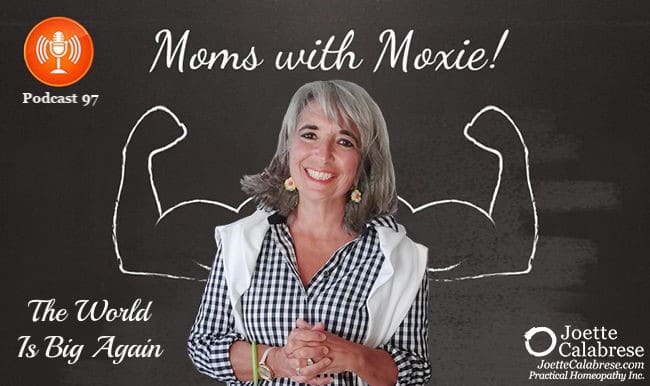
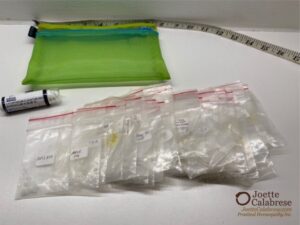
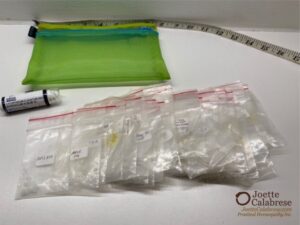
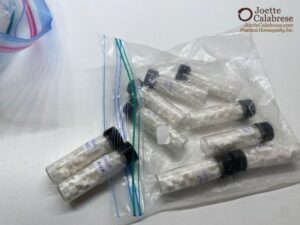
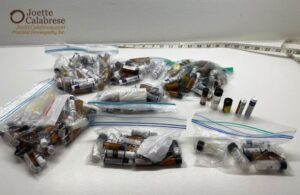
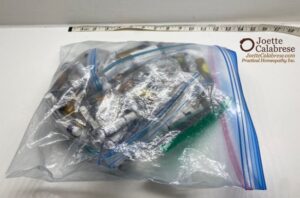

Could you share the remedies that helped you with Chiropractic issues?
We don’t include remedy cards with podcasts in our podcasts but I have plenty of musculoskeletal conditions covered in my blog. articles here.
Insert the name of the condition such as “tendon injury” into the search bar and you’re on your way.